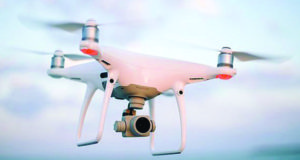R. ARIVANANTHAM
CHENNAI, MARCH 29
Health and Family Welfare Department of Tamil Nadu began sanitising hospitals, metros, and roads across the state.
As many as 300 drones and over 500 pilots were deployed to sanitise public hospitals, metro rail stations, and roads through the local bodies, a release from the Health department said.
Health department officials claimed it as “Surgical Strike on Coronavirus” saying that the method is safe, fewer safety risks and is convenient to cover vast areas in the shortest period, the release further said.
Officials of the department are claiming that the investment in disinfecting public places using a drone was a worthy investment to combat the killer virus.
This method was adopted by local bodies nationwide and municipal authorities have started using mini-choppers (drones) to disinfecting the areas under their jurisdiction.
To replicate the Tamil Nadu model, the Commissioner of Raipur Municipality ordered 8 drones and an equal number of pilots by road from Chennai on Saturday.
In an interview with The Indian Express, Raipur’s Municipal Commissioner Saurabh Kumar said that the city will begin work in areas that have reported confirmed cases. “Israel and Singapore are also doing this. Drones can reach places where manually we cannot — such as slums,” Kumar said.
“We are also planning to use it for public announcements related to coronavirus,” he told the newspaper.
The liquid solution will be of water, hydrogen peroxide, and silver nitrate — a WHO-approved sanitisation combination would be used for sanitation, Kumar said.
“Ground-level workers are optimal carriers for the virus and are susceptible to getting infected, unlike drones,” Garuda founder Agnishwar Jayaprakash said. “Four lakh Indians are doing this job across the country. We have machines that can do what manual public labourers are doing. Why not use it?”, reports The Indian Express.

Along with disinfecting aerial devices in South Korea, China, one of the biggest manufacturers worldwide, has used the miniature vehicles for fever detection, sanitisation, and supply delivery.
In Indore, Municipal Commissioner Ameesh Singh hired two drones from an agricultural company more than a week ago. Each drone can carry 60 litres for a 30-minute flight covering up to 5 acres. Singh said they attempted to cover the whole city but now have narrowed focus on three localities where 13 COVID-19 cases have been found.
“I saw a video of farmers using drones and asked my local officials whether we can re-purpose it for this. With wind, we can cover almost the entire city in a day with two drones,” Singh had told the paper.
In Karnataka, the Bruhat Bengaluru Mahanagara Palike (BBMP) also expanded their sanitisation drive in the city to include the new technology two days ago, mayor M Goutham Kumar told The Sunday Express. They have seven drones and are focusing on hospital buildings and premises.
“The advantage in aerial spraying is it sanitises the entire area, including tops of buildings. But the disadvantage is that they don’t have a carrying larger quantity of chemical mixed spray. They can each carry roughly 13 to 15 litres,” Goutham Kumar told the newspaper.









